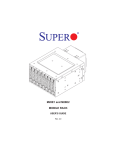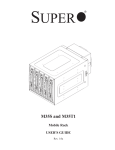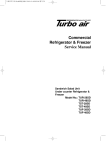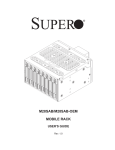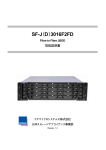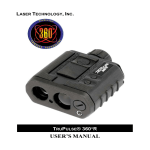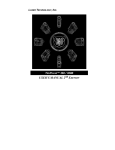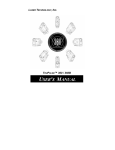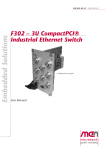Download CSE-M28E1 - Supermicro
Transcript
SUPER
M28E1 and M28E2
MOBILE RACK
USER'S GUIDE
Rev. 2.0a
®
M28E1 and E2 Mobile Rack User's Guide
The information in this User’s Manual has been carefully reviewed and is believed to be accurate.
The vendor assumes no responsibility for any inaccuracies that may be contained in this document,
makes no commitment to update or to keep current the information in this manual, or to notify any
person or organization of the updates. Please Note: For the most up-to-date version of this
manual, please see our web site at www.supermicro.com.
Super Micro Computer, Inc. ("Supermicro") reserves the right to make changes to the product
described in this manual at any time and without notice. This product, including software, if any,
and documentation may not, in whole or in part, be copied, photocopied, reproduced, translated or
reduced to any medium or machine without prior written consent.
IN NO EVENT WILL SUPERMICRO BE LIABLE FOR DIRECT, INDIRECT, SPECIAL, INCIDENTAL,
SPECULATIVE OR CONSEQUENTIAL DAMAGES ARISING FROM THE USE OR INABILITY TO
USE THIS PRODUCT OR DOCUMENTATION, EVEN IF ADVISED OF THE POSSIBILITY OF
SUCH DAMAGES. IN PARTICULAR, SUPERMICRO SHALL NOT HAVE LIABILITY FOR ANY
HARDWARE, SOFTWARE, OR DATA STORED OR USED WITH THE PRODUCT, INCLUDING THE
COSTS OF REPAIRING, REPLACING, INTEGRATING, INSTALLING OR RECOVERING SUCH
HARDWARE, SOFTWARE, OR DATA.
Any disputes arising between manufacturer and customer shall be governed by the laws of Santa
Clara County in the State of California, USA. The State of California, County of Santa Clara shall
be the exclusive venue for the resolution of any such disputes. Super Micro's total liability for all
claims will not exceed the price paid for the hardware product.
California Best Management Practices Regulations for Perchlorate Materials: This Perchlorate
warning applies only to products containing CR (Manganese Dioxide) Lithium coin cells. “Perchlorate
Material-special handling may apply. See www.dtsc.ca.gov/hazardouswaste/perchlorate”
WARNING: Handling of lead solder materials used in this
product may expose you to lead, a chemical known to
the State of California to cause birth defects and other
reproductive harm.
Manual Revision 2.0a
Release Date: August 25, 2009
Unless you request and receive written permission from Super Micro Computer, Inc., you may not
copy any part of this document.
Information in this document is subject to change without notice. Other products and companies
referred to herein are trademarks or registered trademarks of their respective companies or mark
holders.
Copyright © 2009 by Super Micro Computer, Inc.
All rights reserved.
Printed in the United States of America
ii
Safety Information and Technical Specifications
Table of Contents
Contacting Supermicro .......................................................................................iv
Returning Merchandise for Service.....................................................................v
Chapter 1 Safety Guidelines .................................................................... 1-1
1-1
ESD Safety Guidelines ................................................................................... 1-1
1-2
General Safety Guidelines .............................................................................. 1-1
1-3
An Important Note to Users ............................................................................ 1-2
Chapter 2 Introduction .............................................................................. 2-1
2-1
Overview ......................................................................................................... 2-1
2-2
Product Features ........................................................................................... 2-1
Operating Systems ..................................................................................... 2-1
Additional Information ..................................................................................... 2-2
Chapter 3 Jumper Settings and Pin Definitions .................................... 3-1
3-1
Front Connectors and Jumpers ...................................................................... 3-1
Explanation of Jumpers .................................................................................. 3-2
3-2
Rear Connectors and LED Indicators ............................................................. 3-3
3-3
Expander Card ................................................................................................ 3-4
Front Connector and Pin Definitions ............................................................... 3-5
Jumper Settings .............................................................................................. 3-6
Chapter 4 Installation Instructions .......................................................... 4-1
4-1
Shipping List.................................................................................................... 4-1
4-2
Tools Required ................................................................................................ 4-1
4-3
Other Parts ...................................................................................................... 4-1
4-4
Setup and Installation Steps ........................................................................... 4-2
4-5
General Safety Guidelines .............................................................................. 4-2
4-6
Before Accessing the Mobile Rack ................................................................. 4-2
4-7
Cooling Fan Installation .................................................................................. 4-3
Fan Removal ................................................................................................... 4-4
4-8
Hard Drive Installation ..................................................................................... 4-4
4-9
Connect Data and Power Cables ................................................................... 4-6
4-10
Advanced Configuration .................................................................................. 4-6
iii
M28E1 and E2 Mobile Rack User's Guide
Contacting Supermicro
Headquarters
Address:
Super Micro Computer, Inc.
980 Rock Ave.
San Jose, CA 95131 U.S.A.
Tel:
+1 (408) 503-8000
Fax:
+1 (408) 503-8008
Email:
[email protected] (General Information)
[email protected] (Technical Support)
Web Site:
www.supermicro.com
Europe
Address:
Super Micro Computer B.V.
Het Sterrenbeeld 28, 5215 ML
's-Hertogenbosch, The Netherlands
Tel:
+31 (0) 73-6400390
Fax:
+31 (0) 73-6416525
Email:
[email protected] (General Information)
[email protected] (Technical Support)
[email protected] (Customer Support)
Asia-Pacific
Address:
Super Micro Computer, Inc.
4F, No. 232-1, Liancheng Rd.
Chung-Ho 235, Taipei County
Taiwan, R.O.C.
Tel:
+886-(2) 8226-3990
Fax:
+886-(2) 8226-3991
Web Site:
www.supermicro.com.tw
Technical Support:
Email:
[email protected]
Tel:
886-2-8226-1900
iv
Safety Information and Technical Specifications
Returning Merchandise for Service
A receipt or copy of your invoice marked with the date of purchase is required before any warranty service will be rendered. You can obtain service by calling your
vendor for a Returned Merchandise Authorization (RMA) number. When returning
to the manufacturer, the RMA number should be prominently displayed on the
outside of the shipping carton, and mailed prepaid or hand-carried. Shipping and
handling charges will be applied for all orders that must be mailed when service
is complete.
For faster service, RMA authorizations may be requested online (http://www.supermicro.com/support/rma/).
Whenever possible, repack the mobile rack in the original Supermicro carton, using
the original packaging material. If these are no longer available, be sure to pack the
mobile rack securely, using packaging material to surround the mobile rack so that
it does not shift within the carton and become damaged during shipping.
This warranty only covers normal consumer use and does not cover damages incurred in shipping or from failure due to the alteration, misuse, abuse or improper
maintenance of products.
During the warranty period, contact your distributor first for any product problems.
v
M28E1 and E2 Mobile Rack User's Guide
Notes
vi
Safety Information and Technical Specifications
Chapter 1
Safety Guidelines
To avoid personal injury and property damage, carefully follow all the safety steps
listed below when accessing your system or handling the components.
1-1
ESD Safety Guidelines
Electrostatic Discharge (ESD) can damage electronic components. To prevent damage to your system, it is important to handle it very carefully. The following measures
are generally sufficient to protect your equipment from ESD.
•
Use a grounded wrist strap designed to prevent static discharge.
•
Touch a grounded metal object before removing a component from the antistatic
bag.
•
Handle the mobile rack backplane and/or expander card by its edges only; do
not touch its components, peripheral chips, memory modules or gold contacts.
•
When handling chips or modules, avoid touching their pins.
•
Put the card and peripherals back into their antistatic bags when not in use.
1-2
•
General Safety Guidelines
Always disconnect power cables before installing or removing any components
from the computer, including the backplane.
•
Disconnect the power cable before installing or removing any cables from the
backplane.
•
Make sure that the backplane is securely and properly installed on the motherboard to prevent damage to the system due to power shortage.
1-1
M28E1 and E2 Mobile Rack User's Guide
1-3
•
An Important Note to Users
All images and layouts shown in this user's guide are based upon the latest
equipment and PCB revision available at the time of publishing. The card and
equipment you have received may or may not look exactly the same as the
graphics shown in this manual.
1-2
Safety Information and Technical Specifications
Chapter 2
Introduction
2-1
Overview
This manual has been written for system integrators, PC technicians and
knowledgeable PC users. It provides detailed information for the installation and
use of the M28E1/M28E2 mobile rack.
The Supermicro M28E1/M28E2 mobile rack showcases advanced technology innovations in modular connectivity and data transferability and supplies reliable,
effective, and scalable solutions for tomorrow’s data communications industry.
2-2
Product Features
The M28E1/M28E2 mobile rack includes the following:
•
Slim design: pocket-size (5.5” W x 2.5” H)
•
Two LSI SAS X12 expanders built-in for the M28E2 and one LSI SAS X12
expander for the M28E1
•
Supports 8 x 2.5” SFF HDD
•
Supports up to 5V/10A (Average) and 12V/10A (Average)
•
Provides at 3 Gbps transfer speed
•
Supports SAS, SATA II with potential support of up to 144 SAS devices
Operating Systems
This mobile rack supports the following operating systems:
•
Windows 2000, Windows XP, and Windows 2003
•
Linux: Red Hat and SuSE
For the most current information on supported operating systems visit the
Supermicro Web site at www.supermicro.com.
2-1
M28E1 and E2 Mobile Rack User's Guide
Additional Information
The M28E1/M28E2 mobile rack was designed for use in certain chassis and servers
or as a stand alone unit. Use the chassis or server manual for installation instructions. Use the instructions listed in this manual to use the mobile rack independent
of a chassis.
The pictures or graphics shown in this user’s guide were based upon the latest
PCB revision available at the time of publication of this manual. The M28E1/M28E2
mobile rack may or may not look exactly the same as the graphics shown in this
manual.
The availability of the SAS devices supported depends upon the readiness of firmware and hardware support.
The SASM28 mobile rack backplane and SASEXP-M28 expander card have been
designed to utilize the most up-to-date technology available, providing your system
with reliable, high-quality performance.
This manual reflects SASM28 Revision 1.00 and SASEXP-M28 Revision 1.01A,
the most current releases available at the time of publication. Always refer to the
Supermicro Web site at www.supermicro.com for the latest updates, compatible
parts and supported configurations.
2-2
Safety Information and Technical Specifications
Chapter 3
Jumper Settings and Pin Definitions
3-1
Front Connectors and Jumpers
13
1
JP25
OH Temperature
1
Signal Receptacle
84
2
S2
++
J6
1
+
+
+
PWR/Signal Receptacle
2
+
+
+
+
+
+
12
Figure 3-1: Mobile Rack Backplane (Front)
Front Connectors and Jumpers
1. Signal Receptacle
2. Power/Signal Receptacle
3. Jumper - JP25
3-1
+
+
+
40
+
+
1
+
J5
39
P2
+
+
83
M28E1 and E2 Mobile Rack User's Guide
Explanation of Jumpers
To modify the operation of the backplane,
3
2
1
3
2
1
Connector
Pins
jumpers can be used to choose between
optional settings. Jumpers create shorts
between two pins to change the function
Jumper
of the connector. Pin 1 is identified with
a square solder pad on the printed circuit
board. Note: On two pin jumpers, "Closed"
Setting
means the jumper is on and "Open" means
the jumper is off the pins.
Jumper Settings
Jumper
JP25
Jumper Settings
Open: 45º C
1-2: 50º C
2-3: 55º C
Note
Overheat temperature.
Backplane Connectors
Connector
Description
J5 (P2)
Power/signal receptacle
J6 (S2)
Power receptacle
3-2
Safety Information and Technical Specifications
Rear Connectors and LED Indicators
SASM28
+
D1
+
+ D2
FAIL1
+ D6
+ D3
ACT1
FAIL2
+ D7
ACT2
#6
D9 D18
+ D4
D8
ACT3
D13
+ D9 +
FAIL4
ACT4
+ D10
FAIL5
D14
+ D11
ACT5
FAIL6
+
+
D15
ACT6
D2 D6
+ D12
FAIL7
Rear SAS/SATA Connectors
Rear
Connector
SAS Drive
Number
SAS #0
SAS/SATA HDD #0
SAS #1
SAS/SATA HDD #1
SAS #2
SAS/SATA HDD #2
SAS #3
SAS/SATA HDD #3
SAS #4
SAS/SATA HDD #4
SAS #5
SAS/SATA HDD #5
SAS #6
SAS/SATA HDD #6
SAS #7
SAS/SATA HDD #7
Rear LED Indicators
Rear LED
Hard Drive Activity
Failure LED
SAS #0
D5
D1
SAS #1
D6
D2
SAS #2
D7
D3
SAS #3
D8
D4
SAS #4
D18
D9
SAS #5
D14
D10
SAS #6
D15
D11
SAS #7
D16
D12
3-3
+ D16
ACT7
D12 D16
D10 D14
D4 D8
Figure 3-2: Mobile Rack Backplane (Rear)
D18
+
FAN FAIL OH/DRIVE FAIL
J10
D11 D15
PWR/Signal Receptale
FAIL3
#7
J9
J8
D17
#5
J7
+
SAS Slot 2
D5
ACT0
#4
J4
D3 D7
D1 D5
FAIL0
#3
J3
SAS Slot 1
SAS Slot 0
#2
J2
SAS Slot 5
#1
J1
SAS #5 SAS #6 SAS #7
J8
J9
J10
SAS Slot 7
REV 1.01
SAS Slot 4
#0
SAS #2 SAS #3 SAS #4
J3
J4
J7
SAS Slot 6
SAS #0 SAS #1
J1
J2
SAS Slot 3
3-2
M28E1 and E2 Mobile Rack User's Guide
3-3
Expander Card
Front Connectors
1
18 + 17
#4
REV 1.01A
J2
4
#1
#0 J1
#3
#2
J11
In
#5
14 13
In
J12
SASEXP-M28
In
+
+
1
4-pin PWR Connector
In
JP1
+
In/Out
15
JP4
4
FAN
+
1
16
J4
In/ Out
J3
J13
In/Out
#6
#7
4-pin PWR Connector
In/Out
J14
10
1
+
JP2
19
1
12
JP3
Fan Enable
SASEXP-M28
1
JP5
Buzzer Reset
+
REV 1.01A
Figure 3-3: Expander Card E2 Model (Rear)
Front Connectors
1. Power Connectors (4-pin):
J1 and J2
2. Fan Connector: JP4
6. SAS Port #3 J3
SASEXP-M28
7. SAS Port #4 J11
REV 1.01A
8. SAS Port #5 J12
3. SAS Port #0 J1
9. SAS Port #6 J13
4. SAS Port #1 J2
10. SAS Port #7 J14
5. SAS Port #2 J4
1
SASEXP-M28
14 13
REV 1.01A
J2
4
#1
#0 J1
#3
#2
In
+
In
+
+
1
4-pin PWR Connector
JP1
+
J3
J4
In/ Out
In/Out
16
15
JP4
1
JP3
Fan Enable
+
4
FAN
+
1
4-pin PWR Connector
JP2
1
Buzzer Reset
JP5
Figure 3-4: Expander Card E1 Model (Rear)
3-4
12
+
Safety Information and Technical Specifications
Front Connector and Pin Definitions
1. Backplane Main Power Connectors
Backplane
Main Power
4-Pin Connector
(JP1 and JP2)
The 4-pin connectors, designated JP1 and
JP2 provide power to the backplane. See
the table on the right for pin definitions.
Pin#
Definition
1
+12V
2 and 3
4
2. Fan Connectors
The 3-pin connector, designated JP4 provides power to the fan. See the table on the
right for pin definitions.
Ground
+5V
Fan Connector
(JP4)
Pin#
Definition
1
Ground
2
+12V
3
Tachometer
SAS Ports
3-10. SAS Ports
The SAS ports are used to connect the SAS
drive cables. The 8 ports are designated
#0 - #7.
NOTE: Ports #4, #5, #6, and #7 are available on the E2 models only.
3-5
Port#
Information
0
IN
1
IN
2
IN and OUT
3
IN and OUT
4
IN
5
IN
6
IN and OUT
7
IN and OUT
M28E1 and E2 Mobile Rack User's Guide
Jumper Settings
+
SASEXP-M28
REV 1.01A
J2
4
#1
#0 J1
#3
#2
J11
In
#4
In
#5
J12
In
+
+
1
4-pin PWR Connector
In
JP1
+
J4
In/Out
In/ Out
J3
J13
In/Out
1
4
4-pin PWR Connector
In/Out
#6
#7
JP4
Fan Enable
1
FAN
JP3
Fan Enable
+
J14
+
JP2
1
Buzzer Reset
JP5
+
Buzzer Reset
Figure 3-5: Expander Card E2 Model (Rear)
Jumper
SASEXP-M28 Settings
REV 1.01A
Jumper
Jumper Settings
Note
JP3
Closed: Enabled
Open: Disabled
Fan enable
JP5
Open: (Default) Enabled (No jumper)
Closed: Disabled (Jumper on)
Open jumper resets the
buzzer*
*The buzzer sound indicates that a condition requiring immediate attention has
occurred.
The buzzer alarm is triggered by the following conditions:
1. Hard drive failure
2. Fan failure
3. System temperature over 45º Celsius.
3-6
Safety Information and Technical Specifications
Chapter 4
Installation Instructions
4-1
Shipping List
Examine the your order for the following parts:
•
M28E1/M28E2 mobile rack
•
One 80mm cooling fan (Fan 0084)
•
Thirty-two M3 screws
•
Four round head screws
•
SATA 4-lane cable
4-2
Tools Required
M28E series mobile rack assembly requires the following:
•
Phillips head screwdriver
•
Industry standard anti-static strap (recommended)
4-3
Other Parts
When using this mobile rack independent of a chassis, you may need the following parts.
•
4-pin power cord to connect the mobile rack to a power supply
•
SAS iPass cable (part number CBL-0116; used to connect the SAS ports to the
motherboard or add-on card)
4-1
M28E1 and E2 Mobile Rack User's Guide
4-4
Setup and Installation Steps
Use the following list as a guide to setup and install the mobile rack. If this mobile
rack is to be installed in a chassis, use the instructions in the chassis manual.
Mobile Rack Chassis Installation
1. Unpack and examine system parts.
2. Review all system and safety guidelines.
3. Install the system fan.
4. Install the hard drives.
5. Connect data and power cables.
4-5
•
General Safety Guidelines
Always disconnect power cables before installing or removing any components
from the computer, including the backplane.
•
Disconnect the power cable before installing or removing any cables from the
mobile rack or backplane.
•
Make sure that the backplane is securely and properly installed on the motherboard to prevent damage to the system due to power shortage.
4-6
Before Accessing the Mobile Rack
Prior to Accessing the Mobile Rack
1. Power down and power supply connected to the chassis or server. In addition, unplug all power cords from the wall outlet.
2. Disconnect all necessary cables and label the cables for easy identification.
3. Use a grounded wrist strap designed to prevent static discharge when handling components.
4. Save all screws and fasteners for later use.
5. Familiarize yourself with and follow the instructions in this section.
4-2
Safety Information and Technical Specifications
4-7
Cooling Fan Installation
When using the M28E1 or M28E2 without installing the mobile rack in a larger unit
(such as a chassis), you must install a cooling fan.
For more information on installing the mobile rack into a chassis or server, see the
documentation for your mobile rack or server. You can also visit our Web site at
http://www.supermicro.com.
Release Tabs
Fan Connector
Tab Openings
Figure 4-1: Mobile Rack with Fan
Installing the Cooling Fan
1. Press the release tabs on both sides of the cooling fans, as shown.
2. Attach the fans to the mobile rack by sliding the release tabs into the openings until the fan clicks into place.
3. Attach the cooling fan cable to the fan connector.
4-3
M28E1 and E2 Mobile Rack User's Guide
Fan Removal
Removing the Cooling Fan from the Mobile Rack
1. Remove the fan cable from the mobile rack by gently, but firmly pulling the
cable from the backplane.
2. Press both release tabs and pull the fan from the mobile rack.
4-8
Hard Drive Installation
Each M28 mobile rack includes dummy trays that act as place holders for hard
drives. Before using the mobile rack, you must install hard drives into the trays.
Hard drives are sold separately.
Hard Drive Tray Latch
Release Tab
Figure 4-2: Mobile Rack with Hard Drive Trays
Installing Hard Drives into the Mobile Rack
1. Press the release tabs to open the hard drive tray latch.
2. Using the latch as a handle, pull the tray from the hard drive.
4-4
Safety Information and Technical Specifications
Hard Drive
Hard DriveTray
M3 Screws
Figure 4-3: Hard Drive and Hard Drive Tray
3. Place a 2.5" hard drive in the hard drive tray.
4. Align the hard drives to the rear of the hard drive tray.
5. Secure the hard drive to the tray using four M3 screws (as illustrated).
6. Using the hard drive tray latch as a handle, slide the hard drive into the
mobile rack.
7. Close the hard drive tray handle to lock the hard drive into place.
8. Repeat steps 1-8 for each hard drive that you will install into the mobile rack.
4-5
M28E1 and E2 Mobile Rack User's Guide
4-9
Connect Data and Power Cables
Connecting the Cables
1. Connect the SAS cables to the mobile rack. A longer SAS cable may be
required (see the recommended cables listed earlier in this manual).
2. Connect the power cables from the chassis power supply. A power cable
extension may be required.
4-10 Advanced Configuration
Use the following instructions in the unlikely event that you must access the jumpers, buzzer, or other backplane components.
Mobile Rack
Casing
Remove
Screws
Figure 4-4: Mobile Rack and Rear Casing
Accessing the Mobile Rack Backplane (Optional)
1. Remove the two screws that secure the casing to the mobile rack.
2. Slide the casing downward and remove it from the mobile rack.
4-6
Safety Information and Technical Specifications
Notes
4-7
M28E1 and E2 Mobile Rack User's Guide
Disclaimer (cont.)
The products sold by Supermicro are not intended for and will not be used in life support systems, medical equipment, nuclear facilities or systems, aircraft, aircraft devices,
aircraft/emergency communication devices or other critical systems whose failure to perform be reasonably expected to result in significant injury or loss of life or catastrophic
property damage. Accordingly, Supermicro disclaims any and all liability, and should
buyer use or sell such products for use in such ultra-hazardous applications, it does so
entirely at its own risk. Furthermore, buyer agrees to fully indemnify, defend and hold
Supermicro harmless for and against any and all claims, demands, actions, litigation,
and proceedings of any kind arising out of or related to such ultra-hazardous use or
sale.
4-8
























